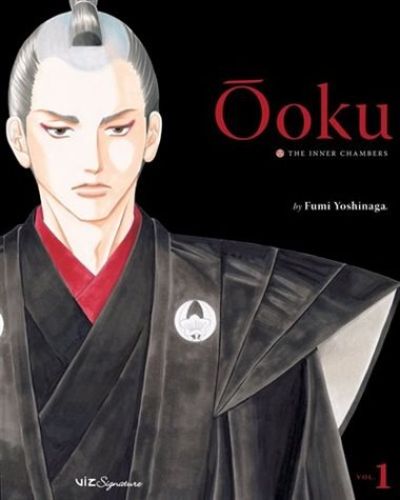Like a Butterfly
Ôoku: The Inner Chambers, volume 1
By Fumi Yoshinaga

16 Nov, 2017
0 comments
2009’s Ôoku: The Inner Chambers, Vol. 1 is the first tankōbon in Fumi Yoshinaga’s long-running alternate history manga series. Volumes 1 and 2 shared the 2009 Tiptree Award with Greer Gilman’s Cloud & Ashes.
Eighty years ago, the Red Pox swept across Japan. Men were peculiarly vulnerable to the disease; even now, there are four women for every man. Too precious to risk, men are kept safely sequestered from danger. Occupations once the monopoly of men are now the realm of women.
Good looking Yunoshin shares his seed generously with the poor women of his town, but social barriers prevent him from marrying O‑Nobu, the one woman he loves. Rather than spend his life living near the beloved he cannot have, he applies for a position in the Ôoku, the Shogun’s harem.
Yunoshin vanishes into the inner chambers, never to walk the streets of his hometown again.
All men are precious but they are not equally precious. Just as in the outside world, the men in the inner chambers are sorted into ranks, which are determined in large part by the accidents of attractiveness and family background. The most junior of the Shogun’s men, Yunoshin is the least in the harem, not fit to be allowed in her presence.
Not that it matters. Ietsugu, the current Shogun, is but seven years old and sickly as well. Her vast harem is merely a display of wealth and status assembled by her courtiers, not something that has any relevance to the young girl. Indeed, Ietsugu’s miserable life ends long before she has any interest in men.
Thrifty Yoshimune rises to shogun after years spent managing a poor, rural holding. Her thrifty ways will serve her well. The imperial coffers are nearly bare after years of profligate excess. Still, her background has left Yoshimune painfully ignorant of many things, including the reason that the female rulers of Japan adopt masculine names. As far as she knows, things have always been as they are. Japan as it was before the Red Pox is unknown to her.
Meanwhile, back in the harem that Yoshimune has inherited: Yunoshin eschews the peacock ways of the inner chamber, preferring simpler fashions. Ironically, this makes him stand out in a way that competing to don the most colourful, most expensive attire never could. Yoshimune sees a kindred spirit in Yunoshin. What better choice for her first lover?
Yoshimune’s ignorance of courtly tradition has a terrible cost. By choosinghim, she has condemned Yunoshin to death.
~oOo~
How odd. Even in settings where men are rare, stories still end up dominated by them.
Unlike the malady in Lee Killough’s A Voice Out of Ramah, the Red Pox seems to somehow retain its lethality over generations. Well, the Black Death had no problem spreading carnage across the world in multiple waves. The brief audience Yoshimune has with a Dutch merchant suggests that the Red Pox has not spread to mainland Eurasia. Tokugawa-era isolationism has spared the world that much … at least so far.
Otherwise, even setting aside the matter of sequestering three thousand men for the Shogun, the fact Japan’s population plummeted after the Red Pox suggests that their coping mechanisms, as impressive as they are, are not sufficient to the task. Properly managed, a handful of sufficiently motivated men should be able to satisfy national demand for sperm. The issue doesn’t seem to be that the men are not being shared (although they are not being shared equitably). Perhaps the Red Pox also impacts male fertility?
While O‑Nobu dismisses Yunoshin as a “philandering satyr,” the impoverished hatamoto does his best to use his position as a good-looking, unattached man charitably; he does not charge for his services, preferring to make himself available to women who could not otherwise afford a man. How noble! Of course, this strategy does ensure a never-ending demand for his services.
The culture of the harem offers opportunity for vice and virtue. Many give into the temptation to compete and to prey on each other. Yunoshin prefers a more virtuous path but as the story makes clear, he can make this choice because he is more fortunate than many of his companions.
Ôoku: The Inner Chambers, Vol. 1 is available here (Amazon) and here (Chapters-Indigo).
